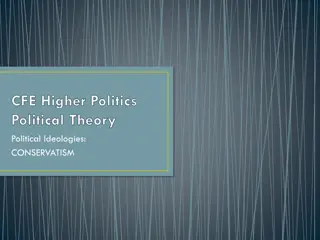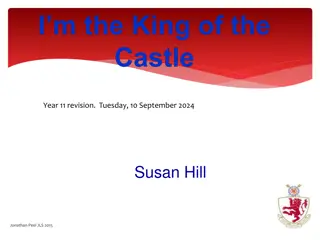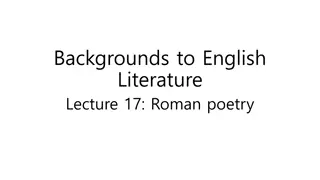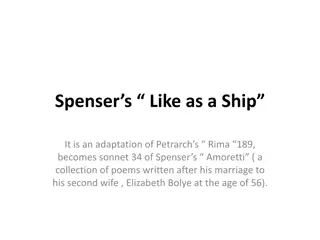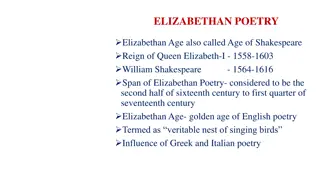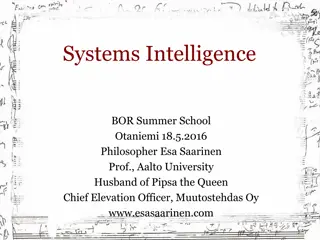Understanding Conservatism: Origins and Principles
Conservatism emerged as a reaction to the upheaval of the French Revolution, valuing tradition, security, and social order. It emphasizes the preservation of traditional institutions and stability, with roots in the beliefs of Edmund Burke. Key features include a focus on human imperfection, traditi
0 views • 21 slides
England's Restoration Period and the Rise of the British Empire
England saw significant historical events during the Restoration Period and the eighteenth century. From Charles II's restoration to the Glorious Revolution, the Act of Union of 1707, and the rise of British dominions worldwide, this era marked political stability, literary contributions, and the gr
1 views • 22 slides
Edmund, Gloucester, Lear - Image Collection
This collection features images of characters from the play "King Lear" - Edmund, Gloucester, and King Lear. Each image showcases a different aspect of the characters, providing visual insight into their personalities and roles within the play.
0 views • 13 slides
British Renaissance Poetry and Prose: Influential Poets and Their Works
Explore the world of British Renaissance poetry and prose through the works of renowned poets like Sir Thomas Wyatt, Edmund Spenser, and Sir Philip Sidney. Dive into the evolution of the sonnet form, from Wyatt's introduction of the Italian/Petrarchan sonnet to Spenser's masterpieces like "The Faeri
1 views • 13 slides
The Death of Kingshaw: A Summary of 'I'm the King of the Castle'
Charles Kingshaw faces relentless bullying and persecution from Edmund Hooper in the haunting setting of Warings. The story unfolds with intense psychological tension as the power dynamics shift between the two boys. As the narrative progresses, we witness the tragic events that lead to Kingshaw's u
2 views • 18 slides
Senator Edmund G. Ross: Political Courage During the Reconstruction Era
Senator Edmund G. Ross demonstrated political courage in the conviction trial of President Andrew Johnson during the Reconstruction era after the Civil War. Amidst conflicts between Congress and Johnson, Ross played a pivotal role in a contentious political landscape torn between vindictive policies
0 views • 7 slides
Character Analysis in "The Man Who Was Poe
Detailed descriptions of key characters in "The Man Who Was Poe," including Edmund, Sis, Aunty Pru, the Old Man, Mr. Dupin, Mr. Throck, and Mr. Fortnoy. The narrative explores their physical attributes, personalities, relationships, and roles in the story. Edmund is protective and apprehensive, Sis
0 views • 7 slides
Gordon Lightfoot: The Legend Lives On
Gordon Lightfoot, born in 1938 in Canada, is a renowned musician with influences from folk artists like Pete Seeger. His career as a singer-songwriter began in the 1960s with hits like "If You Could Read My Mind." Lightfoot's songs, including "Carefree Highway" and "Sundown," have solidified his pla
0 views • 67 slides
Overview of Roman Poetry and The Eclogues: A Study in Roman Literature
Roman poetry encompassed various genres such as epic, drama, lyric, satire, and pastoral, with poets like Virgil and Catullus making significant contributions. The neoteric poets, inspired by Hellenistic traditions, added a new dimension to Roman poetry. The Eclogues by Virgil, drawing from Theocrit
0 views • 17 slides
Analysis of Spenser's Sonnet 34: "Like as a Ship" from Amoretti
Spenser's Sonnet 34 from Amoretti depicts a ship lost at sea as an analogy for the poet's estrangement from his wife, Elizabeth. Through vivid imagery and alliteration, Spenser conveys the despair of being adrift without his guiding light. The poem reflects themes of longing, forgiveness, and hope f
0 views • 7 slides
The Life and Works of Edmund Spenser (1552-1599)
Edmund Spenser, born in London around 1552, was a prominent English poet known for works such as "The Faerie Queene" and "The Shepheardes Calender." His contributions to English literature reflected religious, humanistic, and nationalistic ideals. Despite facing personal challenges, Spenser's poetic
0 views • 13 slides
Insights into Elizabethan Poetry: A Glance at the Golden Age
The Elizabethan Age, also known as the Age of Shakespeare, during Queen Elizabeth I's reign from 1558 to 1603, marked a golden era in English poetry. This period saw a flourishing of poetic forms influenced by Greek and Italian poetry. Major poets like Edmund Spenser, Sir Philip Sidney, and William
0 views • 6 slides
The Life and Works of Edmund Spenser: A Poetic Journey
Delve into the life of Edmund Spenser, his admiration for Chaucer, love for writing, and struggles with fame and discontent. Explore his poetic masterpieces and the influences that shaped his literary career.
0 views • 7 slides
Analyzing Edmund and Lear in Shakespeare's King Lear
In Shakespeare's play King Lear, this analysis delves into the characters of Edmund and Lear. The first prompt examines Edmund's sentiments on legitimacy and family relations, while the second discusses Lear's commentary on women's insufficiencies. The use of literary devices, such as diction, image
0 views • 21 slides
Systems Intelligence: Enhancing Intelligent Behavior in Complex Systems
Explore the concept of Systems Intelligence, focusing on intelligent behavior within complex systems through interaction and feedback. This approach emphasizes understanding the interdependency of individuals within a larger system, enabling intelligent actions and decision-making. Delve into practi
0 views • 21 slides
The Literary Legacy of Elizabethan Era: Poetry, Drama, and Shakespearean Masterpieces
The Elizabethan Age marked a rich literary period with the emergence of new classicism and romanticism. Notable poets like Spenser, Donne, and Wyatt, along with pre-Shakespearean dramatists, paved the way for the renowned works of William Shakespeare. His poems and plays, ranging from comedies to tr
0 views • 11 slides
